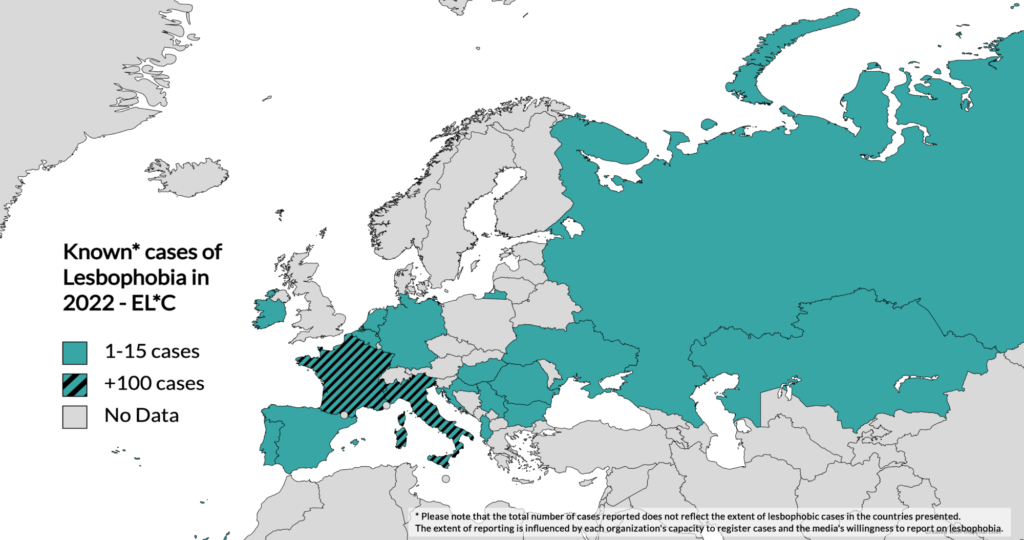Observatory on Lesbophobia 2019-2022

* Please note that the total number of cases reported does not reflect the extent of lesbophobic cases in the countries presented. The extent of reporting is influenced by each organization’s capacity to register cases and the media’s willingness to report on lesbophobia.
EL*C – EuroCentralAsian Lesbian* Community works to improve the rights, visibility, and well-being of lesbians throughout Europe and Central Asia. This report focuses on lesbophobic violence and discrimination, with a special focus on lesbophobic aspects of harmful practices. The EL*C Observatory on Lesbophobia was launched in Feb 2022 and collected cases from 50 collaborators. The EL*C issues a recommendation to policymakers and public authorities to address lesbophobia, gender-based violence and hate crime against lesbians.
40% of cases concerned violence in public spaces, 63% of cases of lesbophobia in public spaces involve couples, with physical aggression often following a refusal to perform certain acts such as refusing the kiss or let a man “join”. Gender expression and non-compliance with gender roles can also trigger violence. The COVID-19 pandemic has worsened the situation, with many reporting feeling insecure and experiencing police abuse. Lesbians face violence from family members, including lesbophobic and transphobic murders, and the COVID-19 pandemic has heightened the risks. Online spaces have seen an increase in hate speech and patriarchal and misogynistic behaviour. Lesbians face lesbophobic and sexist online insults, disadvantaged online searches and social media, and violence against activists in European and Central Asian countries.
Lesbophobic violence is used to limit the space and freedom of expression that lesbian civil society enjoy in society. In 2021, EL*C identified gaps and challenges in access to justice and support systems and conducted a follow-up survey in November 2022. Legislative gaps in many countries prevent lesbophobic motives from being considered as aggravating circumstances in cases of violent crime against women and LGBTI people, leading to reduced sentences. The European Court of Human Rights found Croatian authorities inadequately responded to a lesbophobic attack. Survivors of lesbophobic violence often fear encountering secondary victimization and lesbophobia when approaching law enforcement and judicial authorities. Lesbians face gender-based violence and lesbophobia, which is underreported and misrepresented in the media.
Politicians and public figures spread hateful narratives without consequence, leading to physical and psychological harm. Lesbians experience violence and lesbophobia in Europe and Central Asia, leading to barriers in accessing justice, prevention and protection. Heteronormative attitudes towards female sexuality create additional difficulties for lesbians experiencing harmful practices such as FGM.
Lesbians face lesbophobia, honour-related crimes and unequal access to public spaces, leading to human rights violations and violence in the family.
The recommendations of the EL*C in order to combat and address lesbophobia include: explicitly identify lesbophobia as violence at the intersection of homophobia and misogyny; adapt the psychological support and training of healthcare professionals to the realities and difficulties experienced by lesbians; ensure that all incidents of gender-based violence and domestic violence against lesbians are properly and effectively recorded; ensure adequate, accessible, and reliable funding for projects and activities implemented by organisations focused on and led by lesbians; ensure that the training of relevant professionals include sensitization on the specific needs and challenges faced by lesbians; consider, in legislation concerning sexual violence, the increased risk for lesbians; organise public campaigns to counter violence experienced by lesbians in public spaces, in the family and online; address, in legislation concerning domestic, intra-family violence and “honour crimes”, the specific vulnerabilities of lesbians; and ensure that relevant services take into account lesbians’ experience when providing support.
Read the full report: Observatory-Lesbophobia 2019-2022
